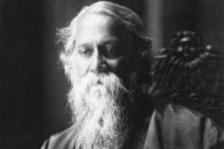One of our members, Sujoy Roy, writes on how Rabindranath Tagore went on a lecture tour to the USA in 1916 and nearly fell into a crossfire of political assassination and American official counter-intelligence.
James B. Pond was Tagore’s tour agent. Pond wrote to Macmillan, the publishers, that “Tagore’s tour could be made one of the biggest lecture tours.” However, half-way through the tour, the Minneapolis Tribune called the poet “the best businessman who ever came to us out of India”. He managed to scold Americans “$700 per scold” and “$700 dollars per plead”. What was meant was that Tagore did not miss out on manifest frowning down on America’s penchant for gross materialism and narrow nationalism; while in the same breath, he was earning every dollar for his school in Santiniketan. This ambivalence was seemingly verging on hypocrisy and was to prove dangerous quite soon.
Back in 1912-13, he had visited the Bay Area on the West Coast with some huge success, making him a cult figure. He had taken San Francisco’s intellectual elites by storm. Now came a fomenting danger from Indian revolutionaries living in the Bay Area, who despite being appreciative of his intellectual prowess, considered Tagore to be standing aloof of anti-imperialist revolutionary movement. They considered the heart of India was in the anti-British revolutionary movement.
A near parallel underlined the minds of Indian youths to Goethe’s non-committal attitude towards Germany’s war of liberation a century ago. A plot to assassinate him was hatched. Two Indian youths were despatched to Tagore’s hotel to do a hatchet job, but the youths chickened out. The American administration got the scent of it and spirited him away to Santa Barbara with police protection.
The newspapers headlined “Hindu Savant Safe After Wild Flight Under Body Guard”. Tagore gave no credence to the approaching political storm over him. He spent a day relaxed, sitting on the beach under the fragrant groves of orange trees. To a reporter he declared about Californian women “It was a pleasure simply to watch them”.
Tagore mooted for the first time the nucleus of his vision of founding Visva-Bharati in Santiniketan as a web of world culture and wrote to his son, Rathindranath, accordingly. This should strike us as a quirky utopia which dawned on him in southern California, in the vicinity of Hollywood—and just a few days after some of his own countrymen anti-British revolutionaries thought of eliminating him. The place was a land of hedonistic culture where gross materialism and instant gratification were the holy grail.
But for the poet, there were hassles. The poet was living out of briefcase, as it were from trains and hotels through a roving lecture tour. He preferred eating quietly alone in his room with Boston Baked Beans, thereby going weak with vegetarian regimen trying to save money for Santiniketan. Perhaps, the food gave him a gaseous estimation of himself.
One early morning, he woke up Pearson on the train telling him that he had tipped his set of teeth down the lavatory basin, where he had kept them on the night before. Fortunately, his dentist at Yokohama had made him a denture which suited him better for public speaking. To add to the troubles, his wardrobe became dispersed. The enraged man had to give a lecture in a silk shirt and tweed trousers providing a hilarious amusement to spectators.
The New York Times commented after reviewing his 10 volumes of work in December that Tagore’s was a lone voice above clamour of nations and their aggrandizement. But the press was divided. He was also regarded as a vaporously philanthrophic thinker like Whitman and others. Now, war clouds were in the air. His views on humanitarian world unity would have to go through wrecking trials in two world wars. He had a dream of bridging an east-west unity between men and matters. But the west itself was divided between imperialist nations going at each other’s throat.
He terminated his tour in America in 1916. "Ich bin mude (I am tired)," he said to his friend Harriet Moody in America.
Postscript
At one time, Rabindranath was once lodged in a grand log-house known as Yama Farms in Catskill Mountains north of New York City. This was a kind of retreat, where outstanding industrialists and intellects like Thomas Alva Edison, Henry Ford, Harvey Firestone, Waterman of fountain pen fame, Mr Colgate and the Kodak among others stayed in close proximity. As the story goes, Tagore was being sketched by two Russian artists in a house on the estate.
Rabindranath pulled out a dime from his pocket saying: “Isn’t it odd that an old gentleman gave me this when he was waiting for his car. Do I look like a tramp?” That evening, the owner of Yama Farms identified the donor as Rockefeller, who had mentioned giving a dime to “an old Negro”.
Pic credit: https://upload.wikimedia.org/wikipedia/commons/1/1a/Rabindranath_Tagore.jpg
Want to share your experience? Please mail your story to writetous@supportelders.com with your name


